Robert Colangelo isn't your typical farmer. He's founded ten environmental startups that all deal with sustainability. "My philosophy has always been market-based solutions to environmental problems. If you find an economic solution, you're going to solve problems much more efficiently than if forced by legislation."
Green Sense Farms, which builds and operates vertical farms around the world, is one of his most successful ventures. Another area of activity for him is brownfield redevelopment. While educating people about building sustainable cities and building green projects on brownfields, he came across many sustainability initiatives. With no dedicated medium to report advancements, Robert decided to start one himself: the Green Sense radio show, which is syndicated on 37 stations, and available as a podcast.
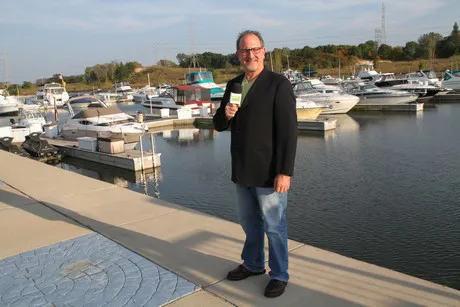
Solar flight as inspiration
The guests on the radio show serve as inspiration to Robert and Green Sense Farms. In one of the episodes, he interviewed Bertrand Piccard, who completed the first successful round-the-world solar powered flight. "When I asked him how he flew a plane at night, when there is no solar power, he said 'our first goal was to make a plane fly with the least amount of energy possible'. I took that and thought, when we build our farms, that's the first thing we need to look at. How do we build a farm that's super energy efficient?"
Reduce, reuse, recycle, rot
Robert goes on to explain the goals at Green Sense Farms: reduce, reuse, recycle, and rot. "Anything that we can't do for the first three, we try to compost. The second is to use as little energy as possible and to use renewable energy sources where we can. The next goal is biomimicry: how do we mimic nature in an indoor growing facility, and how do we use gravity instead of pumps as much as possible?" The most important goal though, Robert says, is recycling nutrients. "We're at about 99 percent right now."
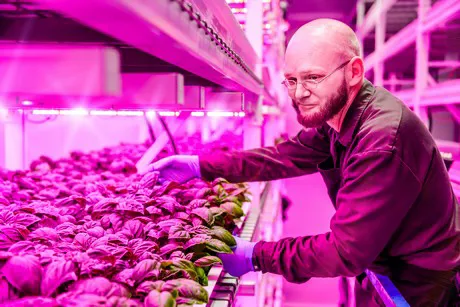
The ideal growing recipe
Green Sense has partnerships with a number of companies: "With Hortimax for our fertigation, with Desert Aire for our climate control systems, with Dramm for our water filtration, and we're working with a number of LED light companies right now to find the best LED light."
It's not just about light though. "I would call it a 'growing recipe'", Robert says. "It's all interrelated: if you change your substrate, it impacts your watering, impacts the climate, impacts the light. And most importantly, we're working with our seed manufacturers to breed seeds that will grow best indoors under LED lights."
Traditional greenhouses, vertical farms: side by side
Breeding special seeds is just one of the ways in which Green Sense is looking to collaborate with others to find the best way to grow vertical farming crops. They look to the traditional greenhouse industry as well. "Greenhouses are very technically advanced. The only challenge is that they need a lot of land and are still impacted a bit by the weather."
Robert believes vertical farming has raised the bar for sustainability in agriculture, but they're not competing with traditional agriculture and the greenhouse industry. "We can use different growing technologies for different crops. For example, field farms with precision farming can be very sustainable now, and they're great for growing commodity crops like wheat, soybeans, and corn. Greenhouses are fantastic, and are very sustainable, if they're operated properly, especially the new high-tech ones, and they're great for growing tomatoes, peppers, cucumbers. Vertical farms are great for growing leafy greens and herbs."
"Organic promotes mediocrity"
Growing sustainably in vertical farms is not the same thing as growing organically, Robert notes. "We're not a big fan of organic. We think that organic is very misunderstood by the consumer. People think they're getting a lot more than they're actually getting with the organic stamp of approval. Organic is a philosophy for growing in soil, but I think there are much better ways to grow vegetables that are good for people and the planet."
He points to the need of a new sustainable growing standard instead of the traditional organic label. "We think there should be a standard that's much like the LEED standard for buildings, where you actually rate a farm on its energy use, water management, its proximity to the customer, it's ability to grow year-round... if you look at a wide range of issues, then the consumer can pick which issues are more important to them, rather than dictating to the consumer.
"Maybe some consumers really want a farm that's local, maybe some want a farm that recycles all their water, maybe others are really concerned about the chemicals. So I think the idea of dictating to the consumer is over, that there needs to be a standard that's more reflective of the impact to the environment and what the consumers feel is important to them."
The problem with the organic label, Robert says, is that it's binary: you either get it or you don't. With a LEED-like standard, you could have a ranking system, and a farm could move up the ranking and become better. "Right now, all you have to do is cross the bar and you're organic. Organic actually promotes mediocrity."
The Art of Sustainability
In addition to growing crops, Robert also sees it as his mission to grow future sustainability leaders. One way in which Green Sense Farms is doing this, is through a partnership with Indiana University. "At our farm, it's really a confluence of art, business and science. So we thought that it would be nice to teach a course on this."
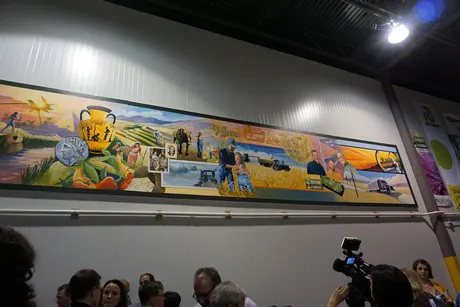
The first Art of Sustainability mural, which adorns the wall of the farm in Portage, Indiana
Together with Mike Keen, founder of the Center for a Sustainable Future at the university, the course, named 'The Art of Sustainability', was started. Once a year, students learn about the interaction of water, energy, transportation and food production. The students look at how that has changed throughout time. "Cities first formed around the ancient Egyptian grain centers," Robert explains, "because the water, the farm, the people were all close together. As we started to get better technology, roads, people got further apart, and got further apart from their food, until now, where we build robot modules for space, we're back to where we started."
The course takes a look at that evolution of agriculture. Then an artist is brought in, who will interpret this process into a mural of about 40 feet long and 6 feet tall. Every time a new Green Sense farm is built, a student-developed mural is hung in that farm. So far there are two murals adorning the walls of Green Sense farms, with a third one in the works.
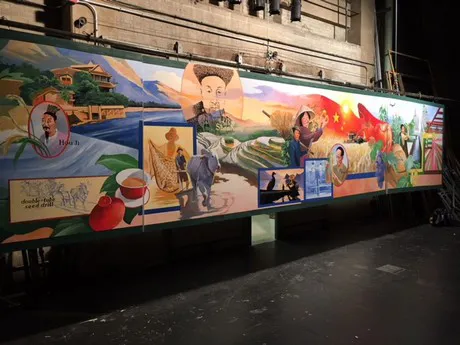
The second mural graces the wall of the vertical farm in China
Speaking about those farms, Robert says: "Our model is to build a brand that's nationally known and locally grown. We build a network of farms at our customers' location. Those we own and operate, and we license our technology abroad." At the moment, Green Sense Farms has already licensed their technology in China, and they're working to expand to other Asia-Pacific countries, as well as countries in the Middle East and Scandinavia. So watch this space, because more Green Sense farms are coming.
For more information:
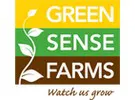 Green Sense Farms
Green Sense Farms6525 Daniel Burnham Drive, Suite B
Portage, IN 46368-1793
Phone: 219-762-9990
Fax: 219-762-9992
www.greensensefarms.com
